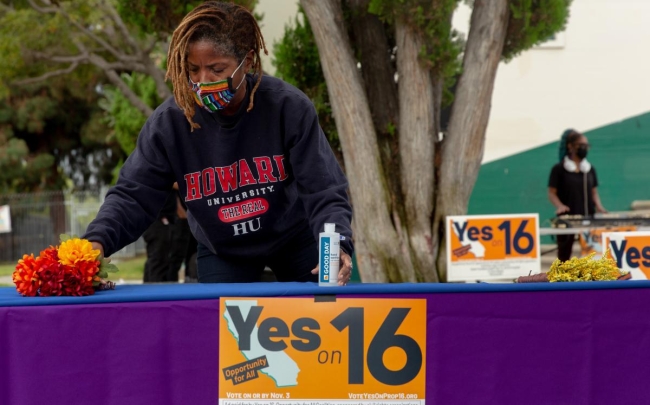You have /5 articles left.
Sign up for a free account or log in.

Student table for Proposition 16
Allison Zaucha for The Washington Post/Getty Images
California voters rejected Proposition 16, which would have restored the right of public colleges and universities to consider race and ethnicity in admissions and financial aid.
The measure proved widely unpopular among voters, who voted against it on Election Day. With 80.4 percent of precincts reporting, the measure had 44.3 percent of the vote. Opponents had 55.7 percent -- and more than 1 million more votes.
The measure would have repealed Proposition 209, which voters approved in 1996. The 1996 measure barred the state from considering race and ethnicity in decisions made by state agencies. It inspired other states to put similar measures on their ballots, which voters largely approved. The California measure led to an immediate sharp decline in Black and Latinx enrollment at the top University of California campuses. Since then, Latinx numbers have grown substantially, but not by as much as the state's Latinx population has grown. Asian enrollments have grown substantially since the passage of Prop 209. The share of white enrollments has not changed dramatically, while Black rates have remained low.
Those who voted early backed the proposal by 53 percent to 47 percent, according to polling by Capitol Weekly. However, early voters were overwhelmingly Democratic.
According to the state, the measure received strong support in the Los Angeles and San Franciso Bay areas.
For years, advocates of affirmative action have sought to reverse Prop 209, and many thought this would be the year. But polling suggested that aside from Black voters, other voters resisted the move to restore affirmative action.
A poll by the Latino Community Foundation found that a slim plurality of the Latinx population agreed with the proposal (50 percent to 48 percent). However, the poll also asked the voters what they perceived Prop 16 to do. Thirty-two percent believed that voting yes would preserve the status quo and block the consideration of race and ethnicity in admissions.
Of those who understood that Prop 16 would allow such consideration, a clear majority -- 65 percent to 34 percent -- was in favor.
Proponents of Prop 16 focused on studies on its impact at the University of California, and its graduates and potential graduates.
The Center for Studies in Higher Education, at the University of California, Berkeley, in August published a paper by Zachary Bleemer, a research associate and Ph.D. candidate in economics.
It was based on a longitudinal database for all University of California applicants from 1994 to 2002. It tracked where they enrolled and their wages through their mid-30s. The findings:
- Ending affirmative action caused the University of California's 10,000 annual underrepresented-minority freshman applicants "to cascade into lower-quality public and private universities."
- Underrepresented applicants' undergraduate and graduate degree attainment declined over all and in STEM fields in particular.
- The average underrepresented applicant's wages declined by 5 percent annually between ages 24 and 34.
- By the mid-2010s, Prop 209 had caused a cumulative decline in the number of early-career underrepresented-minority Californians earning over $100,000 by at least 3 percent.
- Prop 209 also deterred thousands of qualified underrepresented students from applying to any University of California campus.
- Enrolling at less selective University of California campuses did not improve underrepresented minority students' performance or persistence in STEM course sequences.








